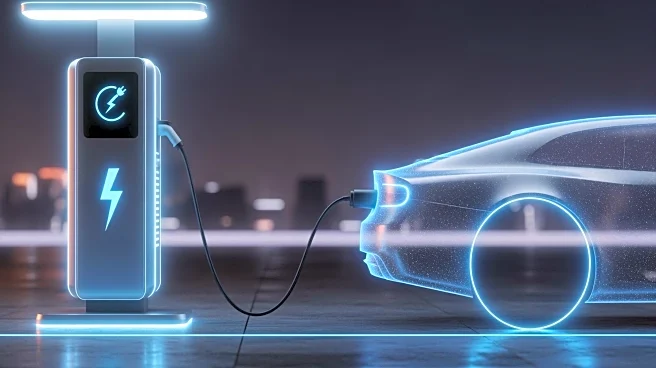What's Happening?
A recent analysis has revealed that charging electric vehicles (EVs) is generally more cost-effective than fueling gasoline-powered cars in the United States. The study, which involved input from industry
experts and data from government sources, found that the average monthly cost of charging an EV is approximately $73, compared to $159 for fueling a gas-powered vehicle. This cost difference is attributed to the lower price of electricity compared to gasoline, despite regional variations in energy costs. The analysis also highlighted that charging at home, particularly during off-peak hours, is the most economical option for EV owners. Public charging stations, while convenient, tend to be more expensive due to additional fees and higher electricity rates.
Why It's Important?
The findings underscore the financial benefits of transitioning to electric vehicles, which could influence consumer decisions and accelerate the adoption of EVs in the U.S. market. As gasoline prices remain volatile, the stability and lower cost of electricity present a compelling case for EVs, potentially reducing the overall cost of vehicle ownership. This shift could have significant implications for the automotive industry, energy providers, and environmental policy, as increased EV adoption may lead to reduced carbon emissions and a decrease in fossil fuel dependency. Additionally, the economic advantages of EVs could drive further investment in charging infrastructure and renewable energy sources.
What's Next?
As the EV market continues to grow, further developments in charging technology and infrastructure are expected. Automakers and energy companies may increase efforts to expand charging networks and offer more competitive pricing plans to attract consumers. Policymakers might also consider additional incentives to support EV adoption, such as tax credits or subsidies for home charging installations. The ongoing evolution of battery technology could further enhance the cost-effectiveness and appeal of electric vehicles, potentially leading to broader societal and environmental benefits.
Beyond the Headlines
The transition to electric vehicles also raises questions about the sustainability of energy sources and the environmental impact of battery production and disposal. As the demand for EVs increases, there may be a greater focus on developing cleaner and more efficient battery technologies. Additionally, the shift towards electric transportation could influence urban planning and public transportation systems, encouraging the integration of EV-friendly infrastructure in city designs.











